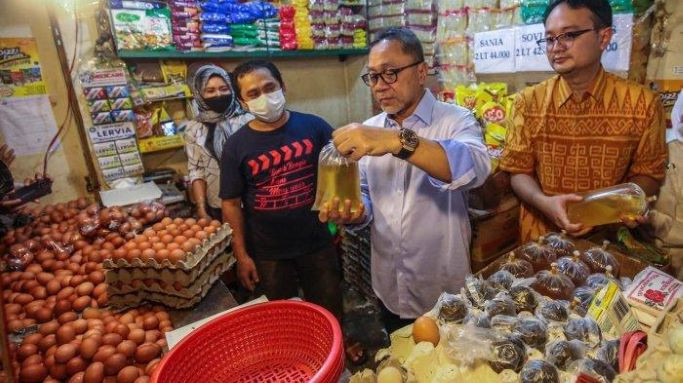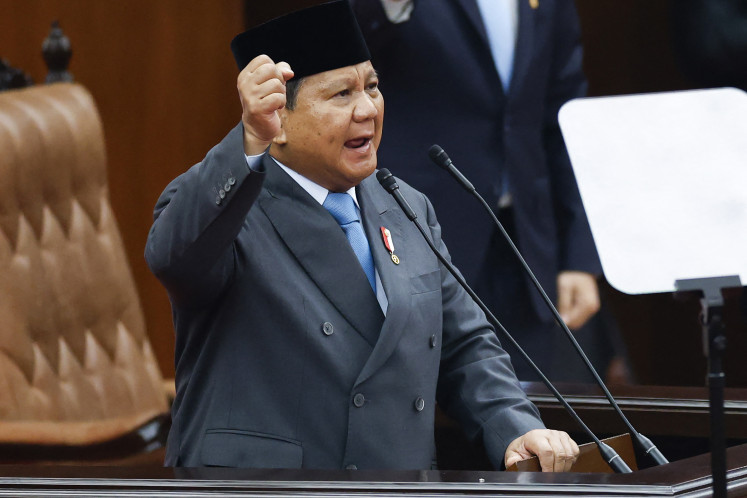Popular Reads
Top Results
Can't find what you're looking for?
View all search resultsPopular Reads
Top Results
Can't find what you're looking for?
View all search resultsInflation slows further, dropping to 4.33% in April
Inflation remained below 5 percent for the second month in a row, while core inflation eased to the lowest rate in 10 months.
Change text size
Gift Premium Articles
to Anyone
I
nflation remained below 5 percent for the second month in a row, with core inflation easing to the lowest rate in 10 months, suggesting government efforts to bolster food supplies and distribution helped contain consumer prices during Ramadan this year.
Statistics Indonesia (BPS) revealed on Tuesday headline inflation had dropped to 4.33 percent in April, further cooling down the consumer price index (CPI) growth from the 4.97 percent year-on-year increase registered in March.
Before that, the rate had been above 5 percent ever since September, when an increase in government-controlled fuel prices drove CPI growth to 5.95 percent, the highest level since October 2015.
“Historically, big religious holidays strongly affect [demand for goods and services] as well as price changes at the consumer level,” said BPS head Margo Yuwono in a press conference on Tuesday.
The monthly increase in consumer prices accelerated to 0.33 percent in April from March’s 0.18, which was attributed mainly to a rise in demand during the fasting month.
However, that seasonal effect leading up to the Lebaran holiday was smaller this year than last year.
Margo explained this was due to the main harvest season taking place in March and April, which helped secure additional supply of agricultural produce at the right time to coincide with the Ramadan increase in demand.
The downward trend was also reflected in regions most urbanites visit for the traditional family get-togethers for the Lebaran holidays, the statistics agency noted, with all of them posting lower CPI growth than during last year’s festive season.
“This represents much better government anticipation than last year, both at the national and at the regional level, as can be seen through lower inflation,” Margo said.
Core inflation, which has become the de-facto basis for Bank Indonesia’s (BI) interest rate policy, eased to 2.83 percent in April, the lowest since June 2022 and down from 2.97 percent logged a month prior. Core inflation excludes from the CPI calculation certain food and energy products that tend to have volatile prices.
BI kept its key interest rates unchanged for the third month in a row as it deems it current monetary policy stance adequate to sustain a downward trajectory in the CPI growth rate and hence to meet its inflation target.
Following its monthly monetary policy meeting, BI announced on April 18 its benchmark seven-day reverse repo rate would remain at 5.75 percent, the level it had reached in January after being raised by a cumulative 225 basis points beginning in August last year.
Read also: BI keeps rates unchanged, expects no more Fed hikes
The biggest contributor to inflation in April was transportation, as consumer prices in this spending category were up 11.96 percent yoy, which Margo attributed to the gasoline price hike that took place last September and surging demand for Lebaran holiday travel.
BPS revealed airfares, train fares and other intercity transportation contributed most to the rise in transportation prices.
Meanwhile, food inflation, which typically spikes ahead of Lebaran, was muted in April, thanks to the aforementioned increase in supply.
Faisal Rachman, an economist with state-owned lender Bank Mandiri, said food inflation was expected to remain manageable, “thanks to the government’s success in maintaining food supply and distribution”.
“Moreover, global commodity prices for food and energy are mostly on a declining trend, providing a let-up for imported inflation and administered price inflation,” said Faisal on Tuesday.
Read also: Inflation falls below 5% for first time since fuel price hike
According to Bank Mandiri projections, annual inflation will continue to ease “and could reach the [central bank’s] target of 2 to 4 percent” by the end of the first half of 2023, earlier than previously anticipated.
“All in all, we maintain our forecast for inflation to be around 3.60 percent at the end of 2023,” Faisal said.
Publicly listed Bank Permata chief economist Josua Pardede said, overall, Indonesia’s volatile price inflation during this year’s Lebaran had been manageable and stable. However, he expressed concern about the El Niño weather phenomenon.
“The impact of El Niño could affect domestic food production, especially for rice. How big of an impact it will be depends on how the government anticipates the phenomenon,” said Josua on Tuesday.
He advised the government to make sure Indonesia had enough food reserves, so that when the time comes and prices surge, the government could release additional supply in a controlled manner.
In addition, Josua opined, the government should keep its options open regarding rice imports, in case domestic supply failed to fulfill national needs should El Niño cause droughts.
The World Meteorological Organization (WMO) announced recently the La Niña phenomenon of the past three years had given way to El Niño this year, bringing higher temperatures and drier weather, as reported by The Jakarta Post.










